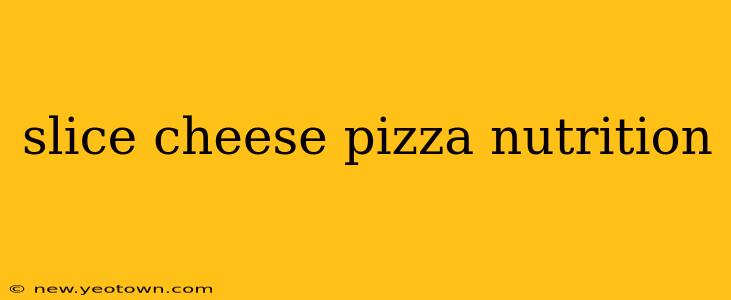Pizza. Just the word conjures up images of warm, cheesy goodness, a comforting classic enjoyed across cultures and generations. But when it comes to that delicious slice of cheese pizza, how much do we really know about its nutritional content? Let's peel back the layers (pun intended!) and explore the facts behind this beloved food.
What are the typical nutritional values in a slice of cheese pizza?
This is where things get tricky. A "slice" of cheese pizza is incredibly variable. The size, the crust thickness, the type of cheese, the amount of sauce – all contribute to the final nutritional profile. However, we can look at a typical slice, roughly representing a 1/8th of a 14-inch pizza. Be warned, these are estimates:
- Calories: Around 280-350 calories.
- Fat: 10-15 grams, often with a significant portion being saturated fat.
- Carbohydrates: 30-40 grams, largely from the crust.
- Protein: 10-15 grams.
- Sodium: A significant amount, often exceeding 500mg, sometimes reaching over 700mg.
It's crucial to remember these are averages, and your actual slice might differ considerably depending on the pizzeria and the ingredients they use.
How many calories are in a typical slice of cheese pizza?
As mentioned above, a typical slice often clocks in around 280-350 calories. But remember, this number can easily jump higher or lower depending on the size of the slice and the ingredients used. A thicker crust, extra cheese, or even a generous helping of buttery garlic sauce will significantly increase the calorie count. Always check the nutritional information provided by your local pizzeria if available.
How much fat, protein, and carbs are in a slice of cheese pizza?
The fat content in a typical slice comes primarily from the cheese and some from the crust. The protein content originates from the cheese and a small amount from the flour in the crust. The carbohydrates come almost entirely from the pizza dough, contributing to the overall calorie count. As with calories, the exact amounts of each macronutrient will depend on the specific recipe and ingredients used.
Is cheese pizza healthy?
This is a complex question with no simple yes or no answer. A single slice of cheese pizza, as part of a balanced diet, won't necessarily derail your health goals. However, relying on pizza as a regular part of your diet could lead to weight gain due to its high calorie, fat, and sodium content. The lack of substantial vitamins and minerals compared to other food groups is also a consideration. Moderation is key! Think of it as an occasional treat rather than a staple food.
What are the potential health effects of eating cheese pizza?
Regular consumption of cheese pizza, particularly in large quantities, can contribute to several health concerns:
- Weight gain: Due to high caloric and fat content.
- High blood pressure: High sodium levels contribute to this risk.
- Heart disease: The saturated fat and sodium intake pose risks.
- Type 2 diabetes: High carbohydrate intake can contribute to insulin resistance.
These are potential risks; however, the frequency of pizza consumption and overall dietary habits significantly influence the impact on one's health.
What are some healthier alternatives to cheese pizza?
If you're looking for healthier alternatives while still satisfying your pizza cravings, consider:
- Thin-crust pizza: Reduces the carbohydrate and calorie intake.
- Whole-wheat crust: Provides more fiber and nutrients.
- Vegetable toppings: Adds vitamins, minerals, and fiber.
- Reduced-fat cheese: Lower in calories and fat.
- Portion control: Stick to a single slice or a smaller pizza.
Making informed choices about the ingredients and the portion size can help mitigate the potential negative health effects associated with eating cheese pizza. Remember, it's all about balance and mindful eating.

